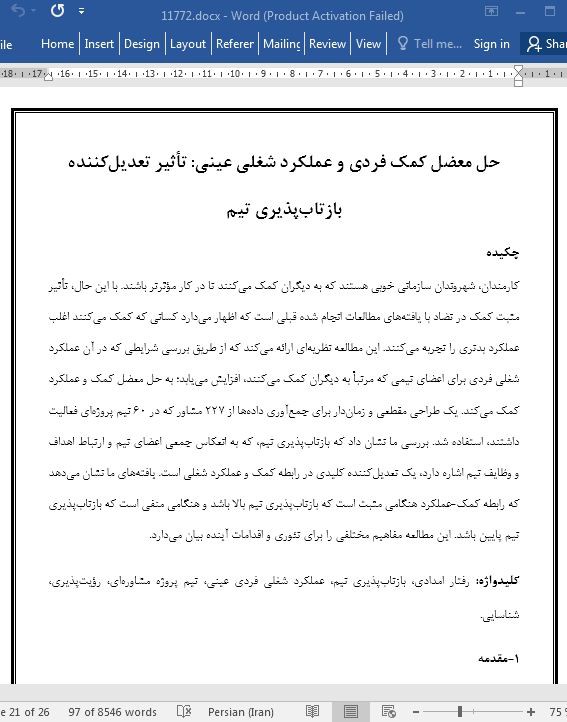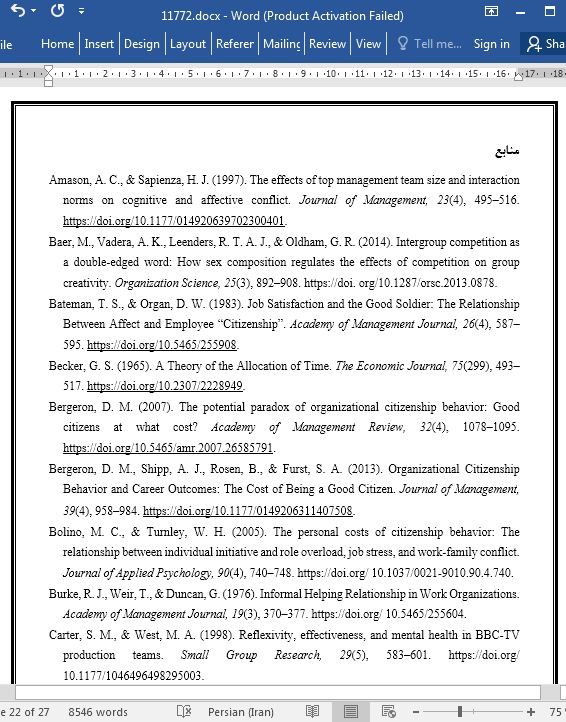
حل معضل کمک فردی و عملکرد شغلی عینی
چکیده
کارمندان، شهروندان سازمانی خوبی هستند که به دیگران کمک میکنند تا در کار مؤثرتر باشند. با این حال، تأثیر مثبت کمک در تضاد با یافتههای مطالعات انجام شده قبلی است که اظهار میدارد کسانی که کمک میکنند اغلب عملکرد بدتری را تجربه میکنند. این مطالعه نظریهای ارائه میکند که از طریق بررسی شرایطی که در آن عملکرد شغلی فردی برای اعضای تیمی که مرتباً به دیگران کمک میکنند، افزایش مییابد؛ به حل معضل کمک و عملکرد کمک میکند. یک طراحی مقطعی و زماندار برای جمعآوری دادهها از 227 مشاور که در 60 تیم پروژهای فعالیت داشتند، استفاده شد. بررسی ما نشان داد که بازتابپذیری تیم، که به انعکاس جمعی اعضای تیم و ارتباط اهداف و وظایف تیم اشاره دارد، یک تعدیلکننده کلیدی در رابطه کمک و عملکرد شغلی است. یافتههای ما نشان میدهد که رابطه کمک-عملکرد هنگامی مثبت است که بازتابپذیری تیم بالا باشد و هنگامی منفی است که بازتابپذیری تیم پایین باشد. این مطالعه مفاهیم مختلفی را برای تئوری و اقدامات آینده بیان میدارد.
1-مقدمه
کمک به همکاران در حل مشکلات کاری در سازمانهایی مانند شرکتهای خدمات حرفهای مهم است؛ چرا که در این سازمانها بیشتر کارها توسط تیمهای پروژهای انجام میشود که خدمات سفارشی مشتریان را عرضه میکنند (Gardner, Gino, & Staats, 2012; Podsakoff, Whiting, Podsakoff, & Blume, 2009). کمک به دیگران به عنوان اقدامی مهربانانه تلقی میشود که میتواند منجر به ارزیابی عملکرد بالای مدیران تیم میشود (Podsakoff et al., 2009). تحقیقات گستردهای نتایج رفتار امدادی در محل کار را مورد بررسی قرار داده است (Burke, Weir, & Duncan, 1976; Grant, 2013; Lanaj, Johnson, & Wang, 2016; Organ, Podsakoff, & MacKenzie, 2006; Organ, 1997; Van Dyne & LePine, 1998). این پژوهش نشان میدهد که کمک به طور متفاوتی با انواع مختلف عملکرد از جمله عملکرد شغلی عینی (Podsakoff et al., 2009)، ظرفیت جذب سازمانی (Hart, Gilstrap, & Bolino, 2016) و نوآوری (Gerke, Dickson, Desbordes, & Gates, 2017 ) مرتبط میباشد.
8- نتیجهگیری
سازمانها کارها را مکرراً به صورت تیمی سازماندهی میکنند و از اعضا انتظار دارند که به یکدیگر کمک کنند تا در اثربخشی کلی سهیم باشند. با این حال، هنگامی که عملکرد شغلی آنها دستخوش تغییر شود، کمک به دیگران میتواند برای افراد گران تمام شود. این مطالعه شرایطی را که رفتار امدادی میتواند منجر به تقویت عملکرد شود رادروشن میسازد و نشان میدهد که چگونه بازتابپذیری تیم به درک مشارکتهای کمککنندگانی که میتواند به تیمهای خودشان کمک کنند، سهیم باشد. ما امیدواریم که این یافتهها به ما در تشویق فراگیرتر کمک در سازمان یاری رساند.
Abstract
Employees who are good organizational citizens help others to be more effective at work. However, the positive impact of helping is at odds with findings across studies suggesting those who help often experience worse performance. This study builds theory and helps to resolve the helping and performance dilemma by exploring the conditions under which individual job performance is enhanced for team members who frequently help others. A cross-level and time-lagged design was used to collect data from 227 consultants nested in 60 project teams. An objective job performance indicator was used. We find that team reflexivity, which refers to team members’ collective reflection and communication regarding team objectives and tasks, is a key moderator in the helping and job performance relationship. Our findings indicate that the helping-performance relationship is positive when team reflexivity is high and negative with low reflexivity. This study offers several implications for future theory and practice.
1. Introduction
Helping co-workers resolve work problems is important in organizations such as professional service firms where most work is done by project teams delivering customized client services (Gardner, Gino, & Staats, 2012; Podsakoff, Whiting, Podsakoff, & Blume, 2009). Helping others has been regarded as an act of kindness that can lead to high performance evaluations from team leaders (Podsakoff et al., 2009). Extensive research has investigated the consequences of helping behaviors at work (Burke, Weir, & Duncan, 1976; Grant, 2013; Lanaj, Johnson, & Wang, 2016; Organ, Podsakoff, & MacKenzie, 2006; Organ, 1997; Van Dyne & LePine, 1998). This research finds that helping is differentially related to various kinds of performance including subjective job performance (Podsakoff et al., 2009), organizational absorptive capacity (Hart, Gilstrap, & Bolino, 2016), and innovation (Gerke, Dickson, Desbordes, & Gates, 2017).
8. Conclusion
Organizations frequently organize work in teams and expect members to help each other in order to contribute to overall effectiveness. Yet, helping others can come at a cost to individuals when their own job performance suffers. This study sheds light on the conditions under which helping behavior can enhance performance, showing how team reflexivity contributes to understanding of the contributions helpers can make to their teams. We hope that our findings will help to encourage more widespread helping in organizations.
چکیده
1-مقدمه
2- پیشینه مطالعاتی و فرضیهها
2-1- کمک و عملکرد فردی
3- فرضیه اول- کمک ارتباط منفی با عملکرد شغلی فردی عینی دارد.
3-1- بازتابپذیری تیم به عنوان یک تعدیلکننده
4- فرضیه دوم- بازتابپذیری تیم ارتباط با رفتار امدادی و عملکرد فردی را تعدیل خواهد کرد به گونهای که هر زمان بازتابپذیری تیم بالاتر باشد، این ارتباط قویتر است.
5- روش مطالعه
5-1- زمینه تحقیق
5-2-مشخصات نمونه
5-3- اندازهگیریها
6- نتایج
7- بحث
7-1- مشارکتهای تئوریکی
7-2- کاربردهای عملی
7-3- محدودیتهای پژوهش و پیشنهاداتی برای مطالعات آتی
8- نتیجهگیری
منابع
Abstract
1. Introduction
2. Literature and hypotheses
2.1. Helping and individual performance
3. Hypothesis 1. Helping is negatively related to objective individual job performance
3.1. Team reflexivity as a moderator
4. Hypothesis 2. Team reflexivity will moderate the link between helping behavior and individual performance such that the link is stronger when team reflexivity is higher
5. Method
5.1. Research context
5.2. Sample profile
5.3. Measures
6. Results
7. Discussion
7.1. Theoretical contributions
7.2. Implications for practice
7.3. Limitations and future research
8. Conclusion
References
- اصل مقاله انگلیسی با فرمت ورد (word) با قابلیت ویرایش
- ترجمه فارسی مقاله با فرمت ورد (word) با قابلیت ویرایش، بدون آرم سایت ای ترجمه
- ترجمه فارسی مقاله با فرمت pdf، بدون آرم سایت ای ترجمه



